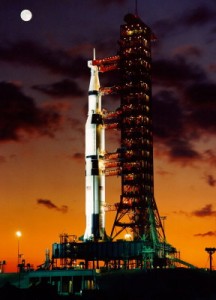What Apollo was…and wasn’t
Miles O’Brien, late of CNN, recently wrote a column reflecting on the accomplishment of the Apollo program and the space program since then.

Miles O’Brien, late of CNN, recently wrote a column reflecting on the accomplishment of the Apollo program and the space program since then. He believes that Apollo was a great leap forward in space, a capability and step from which we then walked away. O’Brien asks why the country has turned its back on the promise of space and what it will take to re-establish the resolve we once showed in reaching for the Moon.
These thoughts are common enough in the space community. Why doesn’t the nation see the conquest of space as critical? Why didn’t wonderful accomplishments of the Apollo program propel us onward to the planets? Why do we continue to condone a space program of such apparent mediocrity?
None of these questions are the right ones because they misunderstand the true purpose of Apollo. The O’Brien column is only the latest in a long series of missives that long for a new renaissance of space travel, to pick up the mantle of space greatness promised by Apollo but abandoned afterwards.
Apollo was not about the Moon, or even about space. It took place in space and ultimately, on the Moon. But Apollo was a battle in the Cold War. John Kennedy did not say, “Go to the Moon and press onwards to the planets.” He challenged America to show the superiority of its economic and political system by landing a man on the Moon and returning him to Earth “before this decade is out.” The key objective was not going to the Moon – it was to beat the Soviets to the Moon. This objective was attained with profound consequences, critical to our Cold War victory to a degree still not fully appreciated.
Most space program observers acknowledge this distinction, but they have only accepted it intellectually, not emotionally. To them, Apollo was a miscarriage of Wernher von Braun’s dream of interplanetary flight. Indeed, von Braun himself thought this. As a firm believer in large engineering projects in service of national goals, he was willing to postpone his incremental, stepping stone architecture to the imperative of reaching the Moon before the Russians. But after the battle was won, he wanted to return to the classic, sequential framework he had always advocated: shuttle, station, moon tug, Mars craft.
The political will for such a program did not exist then and doesn’t exist now. We stopped going to the Moon for a very simple reason – after you win a battle, you don’t keep fighting it. We beat the Soviets to the Moon – the reason for Apollo’s existence. It required a significant fraction of the national wealth to pull off the Moon landing (at peak, almost 7% of the federal budget was spent on Apollo) along with the personal commitment of thousands of engineers and technicians across America, many of whom destroyed their marriages working double hours and weekends to meet tight deadlines. This kind of effort on behalf of a government program is not expended lightly; the Apollo program had the mentality of a war effort. And indeed, that’s exactly what it was.
So what does this mean for our future? Has America lost its way? Is it simply that we no longer dare to do great things in space? I think not. What’s needed is a space program that doesn’t require an industrial war footing. The opportunity given to NASA called the Vision for Space Exploration tried to foster a return to the Moon using small, incremental and cumulative steps. Such a program is congruent both with fiscal realities and with our aspirations to explore.
Miles O’Brien challenges us to drum up a heightened level of public enthusiasm, one that would support a new program that rivals Apollo in scale and ambition. But the experience of the last 30 years shows that in the absence of a credible external threat, the fiscal and human cost of such a space program is simply more than America is willing to pay.
I argue that the challenge for space advocates is to craft a program that matches the level of public support. Much can be done with existing resources if they are obtained and deployed in a rational and ingenious manner. Humanity instinctively gravitates toward exploration. People sense that engaging in these pursuits is about much more than politics, diplomacy or prestige. It's about human survival.
Are we willing to build a lasting spacefaring infrastructure – to change wartime resolve and bravery into an enduring legacy of human achievement? If so, the greatest days of our space program may yet lie ahead.
/https://tf-cmsv2-smithsonianmag-media.s3.amazonaws.com/accounts/headshot/blog_headshot_spudis-300x300.jpg)
/https://tf-cmsv2-smithsonianmag-media.s3.amazonaws.com/accounts/headshot/blog_headshot_spudis-300x300.jpg)